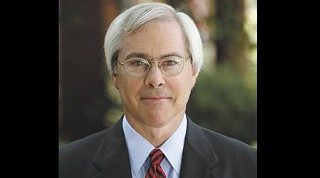Democrat John Barrow has been Savannah's congressman since 2004. Though an early supporter of Barack Obama's presidential run, he has since become something of a thorn in the president's side on the issue of health care reform.
As a member of the so-called "Blue Dog" coalition of conservative House Democrats, Barrow has been working to pare down the scope of the president's proposal, especially in the area of a publicly-funded insurance option.
In the wake of increasingly heated public protests against health care reform, Barrow has kept something of a low profile that has displeased liberals and conservatives alike who want to know where he stands. However, last week Barrow agree to a lengthy interview with us to clarify his position.
The healthcare debate has gotten pretty heated, so as both houses of Congress return to DC after the summer recess and work begins on reconciling the House and Senate bills trying to find a middle ground, what would you like to see happen with healthcare reform?
John Barrow: First off, there's an awful lot of middle ground out there it's just not very well reflected in the two camps that are dominating the debate in Washington. Back home I think most folks are coming around to the idea that there are a lot of things that need doing, that can be done and should be done to add great value to the insurance that folks currently pay for and can also cut into the number of uninsured a great deal. If we had insurance regulation for the first time ever in this country that prevented health insurance companies from raising your premium after you get sick, or cutting you off after you make the first of a long series of claims as a result of a disease or injury, then you're covered. In other words, if we made them behave like we make the property and casualty folks behave, if we made them compete like Coke and Pepsi have to do, we could stabilize and add value to the contracts of insured folks who are never making claims, we could get a whole bunch of the uninsured into the pool of folks who can afford their own health insurance, we could make a lot of progress if we just treated the health insurance industry the way our free enterprise system treats the rest of big industry and commerce in this country. What we've got right now, at the leadership level though, is two camps, one group of folks saying ‘hell no, we won't go,' and the other saying ‘my way or the highway.' I think, and I hope, that this August recess has caused folks to on the left to reassess the importance of doing things we can all agree on, and caused folks on the right to have an increased appreciation of the things that need doing that can be done, that will not harm anybody, but help most everyone. If that's the result of the August recess, I think it might turn out a whole lot better than some folks expect.
Is the passing of Ted Kennedy going to change how this thing moves forward? Is that going held up by the left as a tool to politicize this? Or could it give everyone on both sides of the aisle a moment to reflect on why something like healthcare reform might be important?
John Barrow: I wouldn't want to reflect on its impact because it might offend the sensibilities of folks on either side of the issue. The important thing is what's in the best interest of the folks who are paying the bills in this country. What's in the best interest of the people that are struggling right now under a health care system that has incredibly good service, but at an incredibly high cost, that actually makes the cost of healthcare more expensive than it has to be. No legislator has to die or make his legacy around this issue. This is an issue that too many folks are living with day to day. It has to stand on its own merit, it's not going to be a tribute to anybody.
What's it going to take to get over some of this divisive rhetoric and get some of these solutions on the table and discussed? Is it just a matter of cooler heads prevailing? Or is there a way that this can be salvaged now?
John Barrow: There's a lot of potential for that, but it all depends on the players, and whether or not the folks that have taken an extreme position on either side are willing to compromise. We don't have to have compromise. The folks on the right don't have to be willing to compromise if the folks on the left can do enough compromising with those of us in the middle. If we're gonna become the surrogates for those on the right, the public don't care, they just want us to work on solutions that have broad bi-partisan merit, whether they have broad bi-partisan support or not.
Obviously the centerpiece has become these town hall meetings, has there been any pressure for you to hold more public forums locally?
John Barrow: Naturally there are folks that like to get a crack at their hometown congressman, but I've gone to six counties so far in my district and had six town hall meetings, and I've got three more scheduled for this weekend. Augusta and Savannah, the two biggest cities in my district, got prime spot in the town hall rotation list during the last break, when, you may remember, the energy bill was what was hanging fire. There was an eerie pre-cursor to this healthcare debate during that week, as members of congress were forced to vote on an issue that was jammed just before a break, and folks had to vote on things I don't think they understood all that well. I voted against that bill because I thought it was unfair to Georgians, and it wasn't going to work, but I'd had the benefit of studying work on this at the committee level because I was part of the committee that had jurisdiction over the bill. But I had Augusta and Savannah at the head of the rotation list, and had four town hall meetings during that one week. I'm having nine town hall meetings during this August break, and I sort of figure that if I have to start in my hometown every time they change pitchers on us up in Washington, I'd never get around the bases, I'd never get to first base.
I heard a group of people gathered at your office yesterday and dropped off a petition in support of health care reform. How will you reconcile your stance on the issue with the wants and needs of your constituency?
John Barrow: Of course I'm going to consider all points of view, and will obviously consider the depth and the volume of different points of view, but in the final analysis I think folks expect us to do things that will help the most number of people, not to respond to the volume of calls that might come from one side or the other.
Savannah certainly has a fair amount of support for the president and healthcare reform, and we also have a fairly sizeable healthcare industry -
John Barrow: It's groaning under the inefficiencies and the unfairness of the current system, in which you basically have a bunch of people who are uninsured shifting the cost of their care onto those who are insured, a bunch of insurance companies are able to behave pretty much any way they want to because they dominate the marketplace and there's no effective competition. Where I'm having an ongoing debate with me in the center and folks on the left, is some folks sort of feel like we ought to give up on private enterprise altogether because it's been tried and found wanting, and go straight to some public enterprise, some sort of medicare type program. My own feeling is that we've only given private enterprise a chance to fail in the healthcare industry. We haven't given it a chance to succeed. It ought to be given a chance to work before it is tried and found wanting. When I say it hasn't been allowed to succeed, it's because they are exempt from the anti-trust laws. I mean, try and imagine what life would be like for the consumer if Georgia Power Company didn't have to go to the Public Service Commission before they decided to change rates on you. That's sort of what we've got in the health insurance industry.
Has the entire dialogue become derailed and what we really need to be talking about is better regulation of insurance companies, which will then cause a trickle down effect of better and more affordable care?
John Barrow: I won't say it's been derailed, but right now it's being dominated by proposals that seek to regulate insurance companies through the back door in an indirect manner by setting up a very large entitlement program and sort of a healthcare welfare program to lift the people from the ranks of the uninsured directly into the ranks of the insured, basically trying to close all the gaps, so there's no gaps someone can fall between without there being some sort of a program to catch you. I think that's going too far. I don't think you have to do it that way. I think everyone recognizes the insurance industry has been unregulated so long now that they abuse their monopoly power so much that there's a crying need for reform. Some folks want to use that as an occasion to launch a public enterprise that, in the opinion of some, could effectively takeover or run the private healthcare industry out of business. I feel like before we go that far, we ought to give the private enterprise the chance to succeed whereas we've only given it the chance to fail.
Haven't they, because of the free market, been given just as equal an opportunity to succeed without becoming this unwielding beast?
John Barrow: There's no free market that's dominated by a monopoly or by the functional equivalent, which is a few people acting in concert with each other sort of dividing the market between them. That's not a free market. That's under a buyer under no compulsion to buy a seller under no compulsion to sell. That's the exact opposite. What you've got is essentially a market place where there is an inelastic demand for a very vital service. You've got a private enterprise that is vested with a vital public interest. Everybody has a right and a need to get insurance but they get it from folks who can charge whatever they want and there's no effective competition. That's not how we provide good services in any other sector of our economy.
Sure, but since they've been trusted with this vital public service, they have chosen their own path.
John Barrow: Of course. And my point is that because they've chosen unwisely doesn't mean we should abandon the model that guides everything else in our society. We ought to give the rules and the laws that apply to everyone else a chance to operate in the healthcare sector before we go any further. That's the blue dog position. The position is that there shouldn't be a public option. There shouldn't be a publicly chartered, or publicly managed, or publicly accountable healthcare plan that's launched until we first task the private healthcare industry with competing, giving them the legal mandate to do so by removing the exemption from the anti-trust laws and the other circumstances that allow them to effectively evade any meaningful consumer regulation at the state level. Basically to task these folks with doing right for a change and see how that works. If that fails, then we're in a position to decide whether we need to go to the next step.
Have the various members of the blue dog group met during the recess to consolidate their position?
John Barrow: There's been some contact, just comparing notes and seeing how things were going, but the point I just made about the blue dog position on the public option was a position we formally addressed during the run up to the recess a couple of months ago. We set the bar pretty high for a policy position for the blue dogs. We have to have two-thirds support. We passed a resolution calling for a trigger, a term of ours used by most of the policy wonks to describe what I was just going through about a public option first being written in a fashion where it has to compete on a level playing field. You can't give it the power to dip into the public till or leverage medicare or other finance programs to force providers to do what they don't want to do, or take patients they don't want to take. In addition to that, the threshold position taken by the blue dogs is before we even do that, there should be a resetting of the clock on the rules, a repeal of the laws that exempt them from competition and there should be an effective opportunity to measure how they perform, and if they fail to do that then, and only then, should we consider the necessity for a carefully, restrained and instructed public option of some sort that could not possibly drive the private, for-profit industry out of business, but could make it compete more effectively and cause competition to come into the market place. This is the trigger that they're talking about. There should be a public option with a trigger.
Have the blue dogs been able to grow their ranks at all over the recess? As folks have gone back to their own hometowns and their districts, has anyone said, I was on the right or I was on the left, but I think you're plan sounds the best?
John Barrow: I'm not sure. It's a little early to tell, but I can tell you in the run up to the recess we were approached from all across the caucus privately, those of us who were the original seven blue dogs. I'm one of the so-called magnificent seven. I'm not sure if it's the magnificent seven or the seven dwarfs, it depends on your point of view, I guess. But I was one of the seven blue dogs that was forcing the Energy and Commerce Committee to do its homework and to wrestle with all of the issues that were presented by the leaderships draft bill. We were the only committee in the House to struggle and really mark this thing up in earnest. We were the only ones to do that and it was because of me and the other blue dogs on the committee did. While that was going on we were approached by folks from all across the caucus, from the progressive caucus, from the New Democrat Coalition, from quite a few quarters of the caucus you might not expect, and we got private encouragement all across the board to hang tough on this, to have an opportunity to study this. We got a lot of encouragement from folks who aren't blue dogs publicly, but who saw it was bad policy to be jamming things to a vote just to put the cards into the hands of leadership, so they could go into the conference and do our job for us at that level. That's not what we're elected to do.
A couple of months ago, the Washington Post reported that several members of the blue dogs had received campaign contributions from the health insurance lobby and several insurance companies, has that effected how you guys have moved forward on this? Is this part of that political process?
John Barrow: I don't think so and I'll tell you why. Something the stories don't mention is that one of the things that makes a blue dog is that you come from a district that looks a little more like the country as a whole. You tend to represent districts that are more balanced in their composition, districts that are swing districts, districts that could go either way. That's where blue dogs come from. Guess what. Those are the only districts where there are strong and heavily financed challenges year in and year out. Myself for example. I've had five contested elections in four years. Two primaries and three generals. To put it in perpective, in my campaign, we raised and spent as much in the last five years as Jack Kingston spent in the last 18. That's because he comes from a safe seat where there's no real competition, where there's no high stakes. I come from one those where the stakes are a little higher because the district looks a little more like the country as a whole. It's more balanced. It can go either way. Representatives come from districts like that, where the action is, so it's not surprising that there'd be contributions from all across the political spectrum. There's more contributions to candidates, because we're raising and spending more money.





























